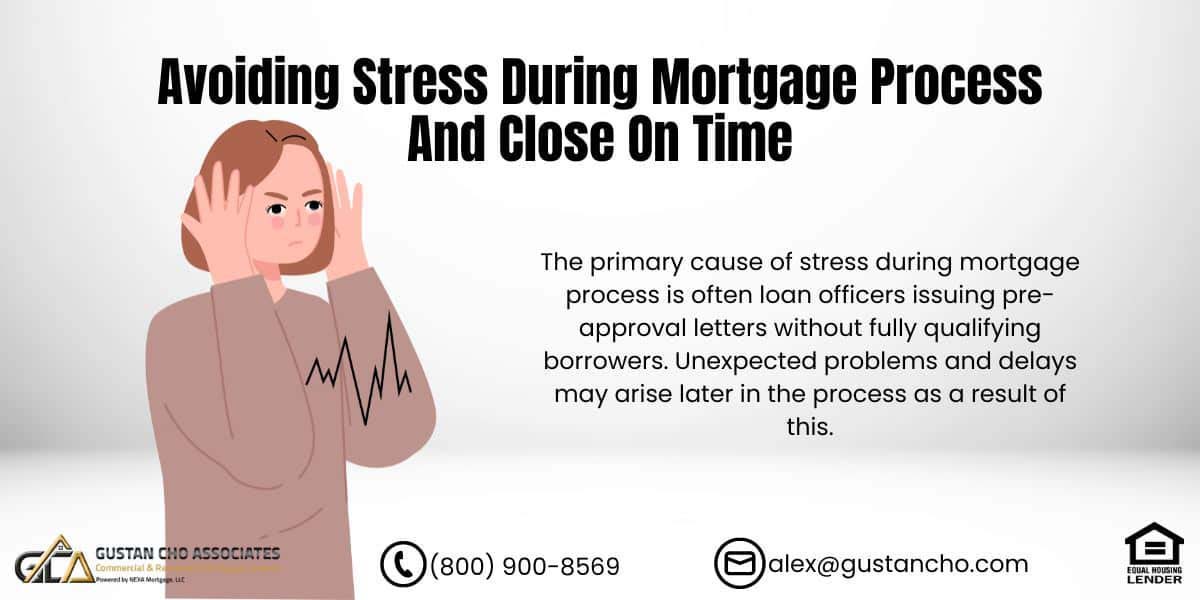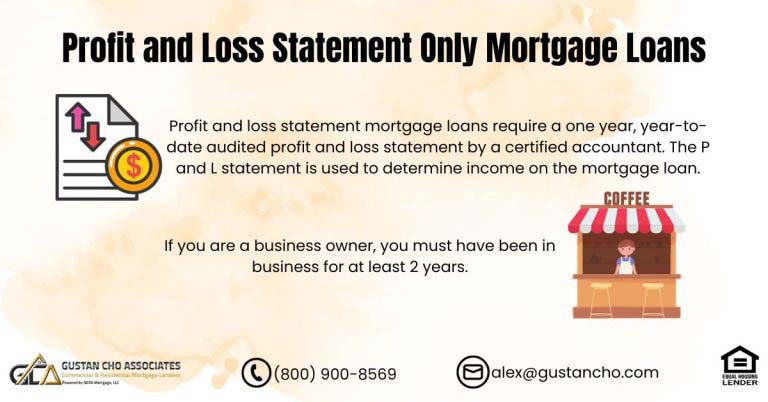Why the Mortgage Process Feels So Stressful
Buying a home should be one of the most exciting times in your life. But for many borrowers, it turns into one of the most stressful. Paperwork, waiting, denials, last-minute surprises — all of this can make the mortgage process feel overwhelming.
Here’s the good news: avoiding stress during the mortgage process is possible. The right lender, the right preparation, and the right guidance can turn a nerve-wracking experience into a smooth path to homeownership. At Gustan Cho Associates, we’ve built our reputation on helping borrowers close on time without stress, even when other lenders say no.
Key Takeaway: How to Avoid Stress and Close On Time
If you don’t read another word, remember this:
- Strong Pre-Approval = Less Stress. A fully documented, verified pre-approval prevents last-minute denials.
- Choose a Lender With No Overlays. Overlays are extra rules that cause unnecessary denials. Gustan Cho Associates has none.
- Stay Organized. Keep your documents ready and respond quickly to lender requests.
- Know the Stress Test. Understand how lenders check if you can handle rising rates.
- Communication is Key. Ask questions, stay in touch with your loan officer, and avoid letting minor issues become big ones.
Follow these steps, and you’ll be well on your way to avoiding stress during the mortgage process and celebrating at the closing table.
Why Borrowers Feel So Much Stress During the Mortgage Process
Buying a home should be exciting, not overwhelming. However, for many homebuyers, the mortgage process turns into one of the most stressful experiences of their lives. Paperwork, waiting on approvals, unexpected conditions, and fear of being denied all pile on pressure.
The truth is, avoiding stress during the mortgage process is possible. Most of the stress comes from being unprepared, working with lenders who have overlays, or receiving a weak pre-approval that doesn’t hold up in underwriting. At Gustan Cho Associates, we specialize in helping borrowers reduce that stress, avoid last-minute surprises, and close on time.
Want a Stress-Free Mortgage Process? Let Us Guide You Every Step of the Way!
Contact us today to learn how we can help you close on time and with ease.
What Causes Stress During the Mortgage Process?
Figuring out what stresses you out is the first step to keeping it at bay. Here are the main things that stress borrowers in today’s market:
- Weak Pre-Approvals: Many lenders issue pre-approvals without thoroughly reviewing essential documents like tax returns and bank statements. As a result, these “soft” pre-approvals can lead to complications later in the process when applicants might discover they don’t actually qualify for financing.
- Lender Overlays: Larger banks and credit unions often impose additional requirements on top of established guidelines from agencies like FHA, VA, USDA, or Fannie Mae. This practice can result in unnecessary loan denials, making it more difficult for borrowers to obtain funding they might otherwise qualify for.
- Credit Disputes or Errors: Open disputes or inaccuracies in a borrower’s credit report can delay or even jeopardize the loan approval process. Addressing these issues promptly ensures that credit files reflect true financial standing and facilitate smoother transactions.
- High Debt-to-Income Ratios: As interest rates are expected to rise further in 2025, borrowers may face increased monthly payments, pushing their debt-to-income (DTI) ratios beyond acceptable limits. This financial pressure makes it crucial for potential homeowners to reassess their budgets and liabilities before seeking loans.
- Appraisal Delays: The current low inventory of homes paired with a high volume of appraisals can lead to significant timeline delays. Such lags in the appraisal process can create stress for buyers and sellers alike, potentially complicating closing dates.
- Poor Communication: When borrowers are left without clear and consistent communication from their lenders, it can lead to frustration and anxiety. Ensuring timely updates and responsive interactions can significantly enhance the overall borrowing experience.
Knowing these pitfalls makes avoiding stress during the mortgage process much easier.
How to Avoid Stress During the Mortgage Process in 2025
Here’s what you can do to make your journey smoother and less stressful.
1. Get a Fully Verified Pre-Approval, Not a “Quick Letter”
Never shop for a home with a flimsy pre-approval. At Gustan Cho Associates, every pre-approval is fully underwritten and documented. That means:
- Income verified with paystubs and W-2s
- Tax returns reviewed for self-employed borrowers
- Bank statements checked for reserves and large deposits
- AUS (Automated Underwriting System) runs with a full file
This process may take longer up front, but it ensures you can shop with confidence and close without last-minute stress.
2. Work With a Lender That Has No Overlays
Most stress comes from being told “no” by multiple lenders. That’s usually not because you don’t qualify — it’s because of overlays.
Overlays are extra lender rules added on top of FHA, VA, USDA, or Conventional guidelines. For example, FHA allows a 580 credit score, but many lenders require 620.
At Gustan Cho Associates, we have zero overlays. If FHA, VA, USDA, or Fannie Mae says you’re eligible, we close your loan. This is one of the most effective ways of avoiding stress during the mortgage process.
3. Stay Organized and Keep Documents Ready
Borrowers who scramble for documents at the last minute create unnecessary stress. From day one, have these ready:
- Two years of tax returns
- Two years of W-2s or 1099s
- 30 days of recent pay stubs
- 60 days of bank statements
- Copy of ID and Social Security card
The more organized you are, the less stressful your loan will be.
4. Know How the Mortgage Stress Test Works
In today’s high-rate environment, lenders don’t just check if you can afford today’s payment. They use a stress test to see if you can handle higher rates or tighter budgets.
This protects both you and the lender. By preparing for this test — paying down debts, avoiding new credit, and budgeting conservatively — you’ll pass more easily and feel less anxiety during underwriting.
Can I Buy a House With Bad Credit Without Stress?
Yes. Many borrowers believe bad credit automatically means stress. That’s not true. At Gustan Cho Associates, we close loans for borrowers with credit scores as low as 500 for FHA and no overlays. The key is working with a lender who understands how to structure your file correctly.
Ready for a Smooth and Stress-Free Mortgage Process? We’re Here to Help You Close On Time!
Reach out now to discover how we can help you stay on track and close on time.
Why Do Lenders Give Different Answers About My Approval?
Not all lenders adhere to the same criteria when it comes to mortgage approvals, which can lead to differing outcomes for applicants. For instance, one lender might reject your application due to a bankruptcy in your history. At the same time, another could approve you almost instantly despite the same circumstances. This inconsistency can be frustrating and stressful for potential borrowers.
To avoid stress during the mortgage process, it’s crucial to select a lender that strictly follows the established agency guidelines rather than imposing additional overlays that can complicate approvals. Doing so increases your chances of a smoother and more straightforward approval experience.
How Do I Avoid Last-Minute Mortgage Denials?
Starting with a strong foundation is crucial to effectively prevent last-minute mortgage denials. The most common reason for these denials is weak pre-approvals. Always insist on a fully documented Automated Underwriting System (AUS) approval to avoid stress during the mortgage process. This means the lender should have thoroughly reviewed your financial documents instead of just giving a quick pre-approval over a short phone call. By ensuring you have solid pre-approval, you can significantly reduce the likelihood of surprises.
What Happens If My Credit Report Has Errors or Disputes?
Credit disputes must usually be removed before closing. If that happens late, your score may drop. Avoid stress by letting your loan officer review your credit early and guide you on disputes before pre-approval.
Practical Tips for Borrowers to Stay Stress-Free
- Don’t Change Jobs or Income Sources: Stability matters. Avoid switching careers mid-process.
- Don’t Open New Credit Accounts: A new car loan or credit card can ruin your DTI.
- Respond Quickly to Lender Requests: The faster you provide documents, the faster your loan moves.
- Plan Ahead for Closing Funds: Wire delays or last-minute fund shortages cause unnecessary stress.
- Stay in Communication: Check weekly with your loan officer and realtor for updates.
Each step directly supports avoiding stress during the mortgage process and closing on time.
Modern Stress Triggers in 2025 and How to Handle Them
Rising Interest Rates
With rising interest rates remaining above historical norms, it’s important to focus on avoiding stress during the mortgage process. To help ease any potential financial strain, consider locking in your rate early if you feel comfortable. Additionally, explore options like FHA or VA loans, which typically offer lower rates. You might also think about temporary buydowns, which can make your initial years of payments more manageable.
Appraisal Delays and Low Values
Due to inventory shortages and high demand, appraisers are extremely busy, which can lead to delays and potentially low property values. To safeguard yourself during this process, it’s essential to order the appraisal early and collaborate with a realtor with a solid understanding of comparable properties in the area. Additionally, it’s wise to have backup funds available in case the appraisal comes in lower than expected.
Technology and E-Closings
More lenders now use digital signatures and online portals. While this speeds things up, it can frustrate borrowers who aren’t tech-savvy. Ask your loan officer for a walkthrough to avoid confusion.
Want to Close On Time Without the Stress? Let Us Help You Navigate the Mortgage Process!
Contact us today to get expert guidance and ensure you close on time and with confidence.
Case Study: From Stress to Success
Maria had been denied by two lenders because of a 590 credit score and a Chapter 13 bankruptcy. She was told she had to wait two more years. A realtor referred her to Gustan Cho Associates.
Here’s what happened:
- We reviewed her file and found that FHA loan allowed her to qualify now with trustee approval.
- We guided her on removing a credit dispute early so her score didn’t drop before closing.
- We issued a fully documented AUS approval, giving her realtor confidence to submit offers.
Result: Maria closed her home in 45 days, stress-free. This is the power of avoiding stress during the mortgage process with the right lender.
Why Working With Gustan Cho Associates Reduces Stress
Borrowers come to us after being denied elsewhere, often frustrated and exhausted. Here’s why we succeed:
- No Overlays: If FHA, VA, USDA, or Fannie Mae says yes, we say yes.
- Full Pre-Approval Process: Every file is reviewed, documented, and run through AUS.
- 7-Day Availability: We work evenings, weekends, and holidays to answer questions.
- Experience With Tough Loans: We handle bankruptcy, foreclosure, collections, charge-offs, and high DTI.
- Close On Time Guarantee: Our system is built to meet deadlines.
This combination is why thousands of borrowers close with us every year — without unnecessary stress.
How to Deal With the Stress of Closing on a House
Even with preparation, closing can feel overwhelming. Here are the final tips:
- Stay Informed: Review documents early and ask questions.
- Stay Organized: Use a simple checklist for insurance, utilities, and moving plans.
- Stay Positive: Think about how awesome your new place is going to be instead of getting bogged down by the stress.
- Stay Supported: Lean on your realtor, lender, and family. You’re not alone.
Final Thoughts: Avoiding Stress During the Mortgage Process Is Possible
Stress doesn’t have to be part of buying a home. By choosing the right lender, getting a solid pre-approval, staying organized, and understanding today’s mortgage environment, you can close on time and with confidence.
At Gustan Cho Associates, we help borrowers every day who were told “no” elsewhere. We’re all about taking stressful situations and turning them into winning stories.
Borrowers who need a five-star national mortgage company licensed in 50 states with no overlays and who are experts on avoiding stress during the mortgage process, please contact us at 800-900-8569, text us for a faster response, or email us at alex@gustancho.com.
We’re available 7 days a week, evenings, weekends, and holidays to make sure you experience a smooth, stress-free mortgage process.
FAQs: Avoiding Stress During the Mortgage Process And Close On Time
Q: What is the Main Reason for Stress During the Mortgage Process?
The primary cause of stress during the mortgage process is often loan officers issuing pre-approval letters without fully qualifying borrowers. Unexpected problems and delays may arise later in the process as a result of this.
Q: How Can Borrowers Avoid Stress During the Mortgage Process?
A: It is crucial to work with trustworthy loan officers who thoroughly qualify you before issuing a pre-approval letter. You must also stay informed about the mortgage process and maintain open communication with your loan officer.
Q: What are Some Qualifications for an Easy Mortgage Process?
A: Borrowers with a high credit score (760+ FICO), stable high-paying job, substantial down payment (around 20%), consistent employment history (over ten years), solid financial reserves, and clean credit history usually experience a smoother mortgage process.
Q: Can Borrowers with Bad Credit Qualify for a Mortgage?
A: Yes, borrowers with past credit issues, including bankruptcy or foreclosure, can still qualify for a mortgage. It may require more effort and finding the right lender to work with their specific situation.
Q: What Should Borrowers Do if They Face Multiple Mortgage Denials?
A: If you’ve faced multiple mortgage denials, contact specialized lenders like Gustan Cho Associates. They can work with unique financial situations and provide guidance to help you eventually qualify for a mortgage.
Q: What is the Mortgage Stress Test?
A: The mortgage stress test ensures borrowers can manage their mortgage payments even if interest rates increase. It includes assessing the ability to pay at a higher interest rate and evaluating debt-to-income ratios. It is applied to all new mortgage applications, renewals, and refinancing.
Q: How Does Working with Borrowers Help Avoid Stress?
A: Working with borrowers helps avoid stress by providing an honest assessment and giving them a clear understanding of their qualifications and areas that need improvement. Additionally, offering step-by-step assistance and advice helps borrowers qualify for a mortgage.
Q: What are Some Key Factors That Can Lead to Mortgage Loan Denial?
A: Factors that can lead to mortgage loan denial include issues with debt-to-income ratio, outstanding credit disputes, and inaccurate public records regarding foreclosures or bankruptcies.
Q: How Can Teamwork and Communication Help During the Mortgage Process?
A: Teamwork and communication are essential for thoroughly vetting borrowers, providing clear instructions, and collaborating with all parties for a smooth and timely mortgage process.
Q: How Do You Deal with the Stress of Closing a House?
A: Dealing with the stress of closing on a house involves staying informed, organizing tasks, communicating regularly, preparing financially, scheduling the move, practicing self-care, and seeking support.
If you have any questions about avoiding stress during the mortgage processor you need to qualify for loans with a lender with no overlays, please contact us at 800-900-8569. Text us for a faster response. Or email us at alex@gustancho.com. The team at Gustan Cho Associates is available 7 days a week, on evenings, weekends, and holidays.
This blog about “Avoiding Stress During the Mortgage Process And Close On Time” was updated on October 15th, 2025.
Stressed About Closing On Time? Let Us Help You Make the Process Easy and Efficient!
Reach out today to learn how we can help you close on time and without hassle.










